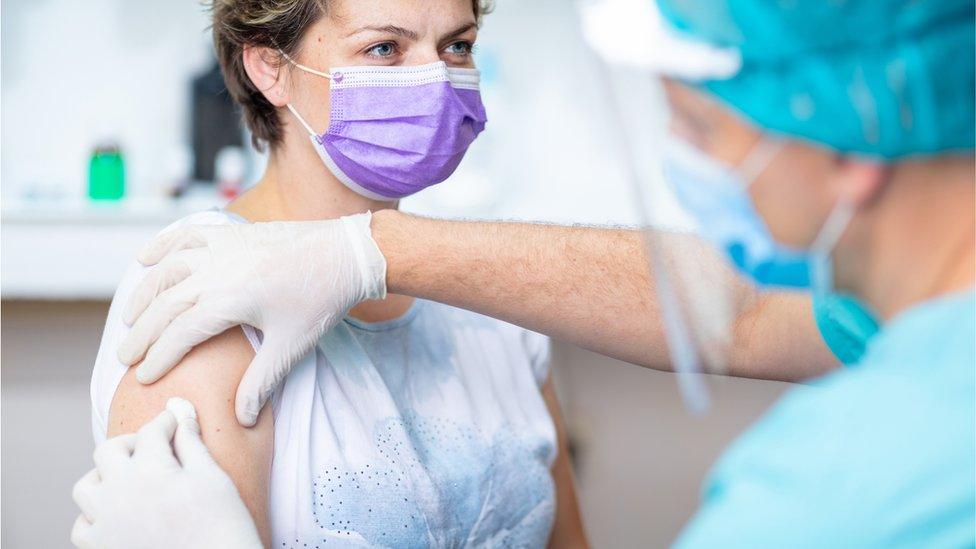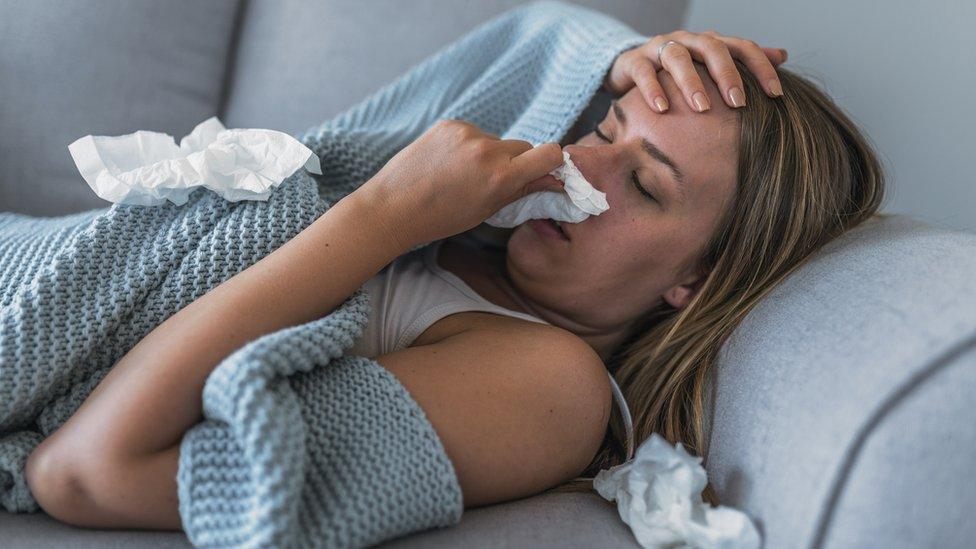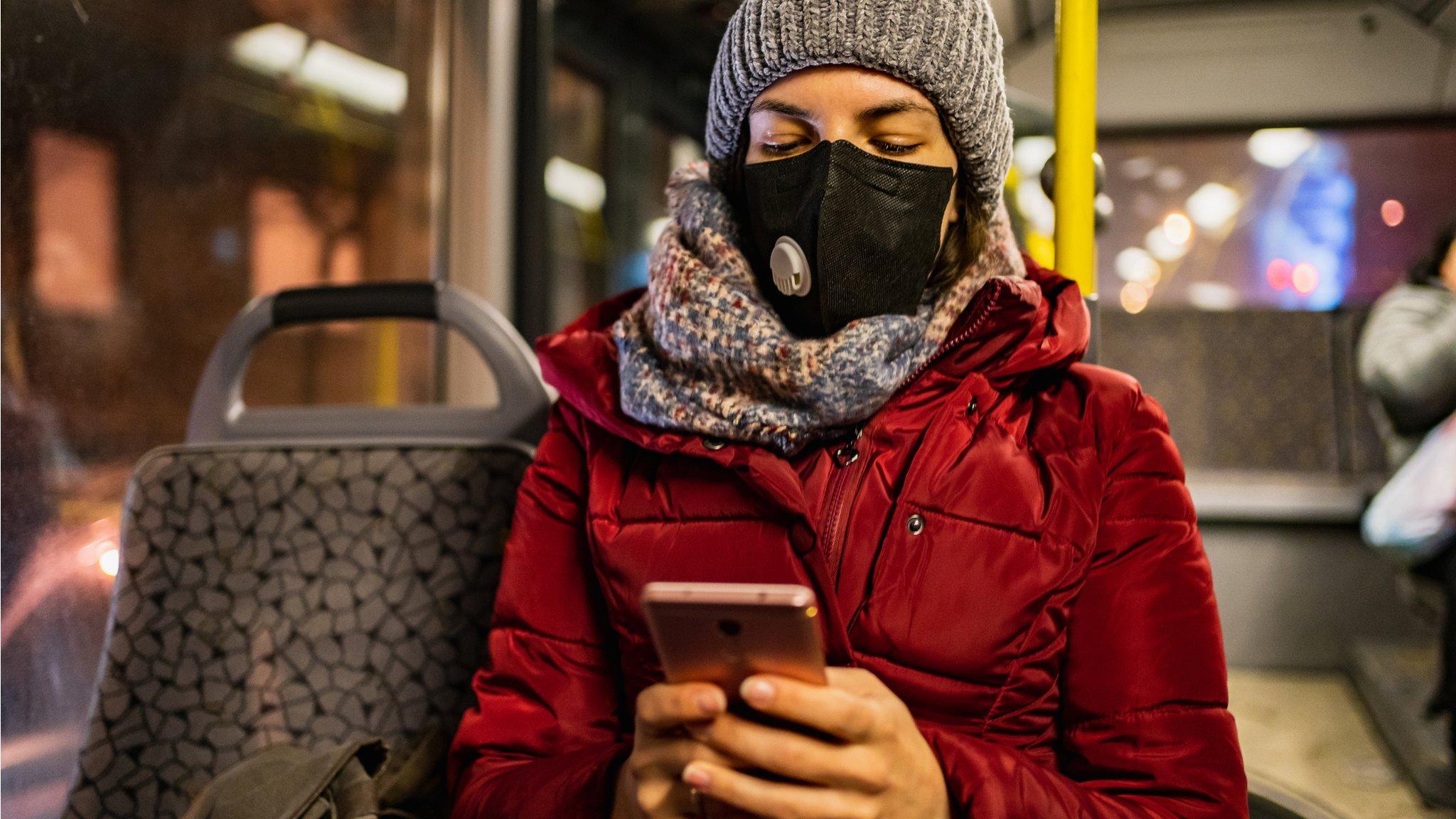Covid in Scotland: Concerns over 'poorly managed' flu vaccination programme
- Published

The roll out of winter flu vaccinations across Scotland has been "poorly managed and patchy" despite the threat of Covid.
Scottish Care also said the transfer of responsibility from GPs to health boards has created a "very piecemeal" approach.
And in NHS Greater Glasgow and Clyde it has emerged the youngest age groups are being invited for their jabs first.
The first minister said vaccinations are an "absolute priority" this winter.
This is the first year when Scotland's 14 health boards have been handed responsibility for delivering the programme instead of GP practices.
The move pre-dates the pandemic as it was part of the new GP contract agreed between the Scottish government and BMA trade union in 2018.
'Very concerned'
But Donald Macaskill, chief executive of Scottish Care, said that while some health boards have progressed vaccination significantly others are not allowing nursing staff into care homes to administer them.
Dr Macaskill told BBC's Good Morning Scotland programme: "We are very concerned that the roll out has been as poorly managed and as patchy as it is.
"This is another tool to protect residents and, critically, to protect staff and we have got to do better.
"If this is a prototype for the vaccination which we hope will come in the spring for Covid then we have got to learn the lessons very quickly."
Asked about his concerns during her daily media briefing First Minister Nicola Sturgeon said her government is engaging with health boards on an ongoing basis.
She added: "The absolute priority, which everybody takes very seriously, is to get everybody who is eligible vaccinated as quickly as possible.
"That is our priority every year, even more important this year."
'Some hiccups'
Scotland's Chief Nursing Officer Fiona McQueen said there has been an "incredibly high uptake" and health boards are being urged to ensure the most vulnerable get access as quickly and as early as possible.
She added: "We are confident that all of our boards are fully committed to ensure that everyone who needs the vaccine will get it and will get it as efficiently as possible.
"It is perhaps not surprising that there have been some hiccups this year because it has been the biggest programme we have been expected to deliver."
Age Scotland said it has been inundated with calls from people in the NHS Greater Glasgow and Clyde area who have not yet had an appointment letter.
The charity told The Herald, external these include those aged 70 and above who are most at risk of catching Covid.
'Absolute shambles'
A Govan GP also told the paper he had heard of patients in other parts of the country receiving letters after their appointment date had already passed.
Dr John Montgomery said: "It's an absolute shambles. Of all the years we had to be coordinated and organised, and we're not.
"I really feel for patients who are understandably are thinking 'what's going on?'"
The Herald reports NHS GGC opted to retrofit the new system onto software originally designed for childhood vaccinations.
This means 65 year-olds are being invited for their jabs before those in their 90s.
The paper claims the oldest candidates may have to wait until the end of November or even December.
NHS GGC said more than 400,000 people will receive the vaccine in the next three to five weeks.
Dr Linda de Caestecker, director of public health, said the board is using a national immunisation system so members of the public receive an appointment in their letter, rather than a request to contact the board to arrange one.
She added: "We are committed to ensuring that all of those who are eligible will receive their vaccination and I would personally like to provide reassurance to members of the public that they will receive their appointments in the coming weeks."
Dr de Caestecker also confirmed the system, which schedules appointments from the youngest to the oldest, will still offer all over 65s an appointment before the flu season begins at the end of November.
'Recipe for disaster'
Opposition politicians have also expressed concern about the delays.
Scottish Labour health spokesperson Monica Lennon described the situation as a "recipe for disaster" and said constituents have told her they are finding it harder this year to get information and appointments for their flu vaccinations.
Ms Lennon said: "Older people in particular have been hit hard by the pandemic, and now it appears they're being badly let down on flu vaccination too.
"The Scottish government must take urgent action to protect lives and prevent chaos in our NHS this winter."
Scottish Conservative health spokesman Donald Cameron said: "It's a disgrace that we're heading towards winter and the people across Scotland who need it most can't get easy access to the flu jab.
"The entire flu jab system is creaking and increasingly looks to be falling into chaos across Scotland."
In Scotland vaccines are procured nationally by the NHS for those in eligible groups.
The Scottish government has said that with Covid-19 circulating at the same time as the flu, it was "more important than ever" to get vaccinated this year.
In addition to over 65s, health workers, those with medical conditions, social care workers, families of shielders and over 55s are being offered the flu jab this year.
But such has been the unprecedented demand for private vaccinations that Boots , externaland Well , externalhave suspended new flu appointment bookings.
Other pharmacies have also reported stock shortages, external.
Although little is still known about how Covid will interact with influenza data emerging from southern hemisphere countries, that have already had their flu season, is encouraging.
It suggests the combination of social distancing and improved hygiene has resulted in historical lows of other respiratory virus infections.
Scotland's deadliest flu epidemic, external dates back to 1989 when 2,400 people died in the seven days to Christmas Eve.
This figure is also greater than the 1,978 people who died in the second week of April this year, the worst week so far of the Covid pandemic.


- Published26 September 2020

- Published5 April 2022

- Published27 July 2020
